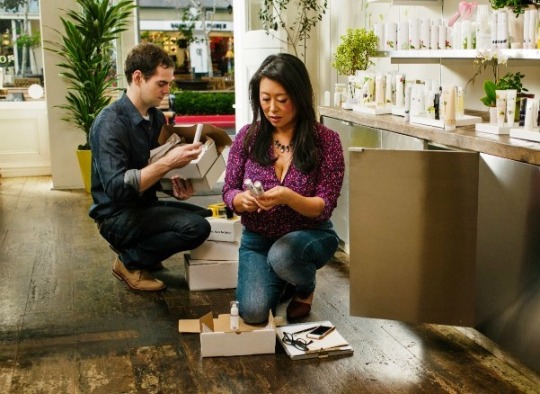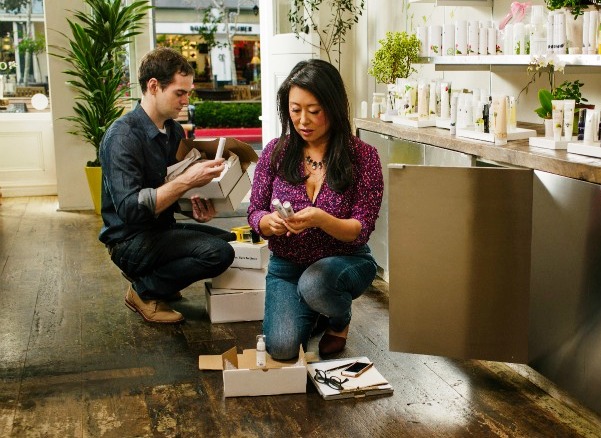(This article originally appeared on OPEN Forum, a website from American Express OPEN designed to help small-business owners find new ideas that can make a difference for their businesses.)
It all started with an accident. About ten years ago, Susie Wang was an independent contractor who formulated products for major cosmetics companies. One day she accidentally knocked over a vial of a dangerous chemical she was working with, which ended up warping her lab table. “Why am I even using such a harsh chemical to make products people use on their bodies in the first place?“ she asked herself.
That was an "aha” moment for Wang, and it inspired her to quit her lucrative job (she was earning royalties on the products she created) and create her own line of pure, natural cosmetics instead. She joined up with her brother, James, and Ric Kostick, her boyfriend at the time and a classmate at the University of California, Berkeley, to start a business they called Purity Cosmetics. Under that parent company, they then began developing their flagship brand: 100% Pure. “Our mission was to create the most pure products in the world,“ says Wang, who is now the company’s chief creative ambassador and head of research and development. “We want to make healthy products so people stay healthy.”
Today, 100% Pure is a thriving company with a robust international e-commerce business, 13 retail locations in the U.S. and 150 employees. The company sells about 550 different kinds of health and beauty products, all of which use only safe, naturally-occurring and organic ingredients such as red Korean ginseng, coffee beans and cacao. The company also uses packaging that’s made with recycled or sustainable materials.
That’s proven to be an attractive message for the company’s customer base, primarily affluent women, who have helped the business grow rapidly. The company’s website now receives some 250,000 unique visitors each month and last year shipped out more than 1 million products directly to customers around the world.
You can always get someone to buy something once. But you have to have the best quality products if you want them to come back again and again.
The company also has plans in the works to continue to fuel its growth, in part by expanding its e-commerce operations into countries like China, where its products are already popular. “We fully expect our sales volume in China to outgrow those in the U.S. in about five years,“ says Kostik, who serves as the firm’s CEO. James Wang, the third co-founder, oversees operations as 100% Pure’s chief operating officer.
While the company makes, packages and ships out all of its products from the U.S., it relies on more than 100 different vendors around the world to supply it with the natural ingredients and packaging for its product line. “If we sourced everything just from the U.S., we would only have a limited assortment of products,” says Kostick. “The factories just don’t exist here anymore.“

But sourcing outside the U.S. also created its fair share of headaches. While Wang and Kostick used online searches to find vendors capable of supplying, say, lavender oil or packaging that used non-toxic soy ink, these middlemen were charging exorbitant prices—marking them up three-fold in some cases—for their products. “That made it nearly impossible for us to compete,” says Kostick. Even when they did find a direct supplier, they ran into problems: One vendor they ordered $500,000 worth of mascara tubes from tried to abscond with their money until Wang was able to talk them into giving it back.
While 100% Pure’s three co-founders knew they had a great idea, and the skills to execute on it, they couldn’t see how they could actually build a profitable business without reliable and affordable suppliers.
Then they came across the website Alibaba.com. With the help of the site’s search mechanism, ratings system, background reports and online chat tools, 100% Pure gained the ability to find reputable suppliers literally anywhere in the world without actually having to travel to those countries.
“Alibaba has been such a godsend because we don’t have to waste our time traveling or vetting vendors,“ says Wang. “We can spend our time more wisely on developing our business and executing on it.”
“It’s so easy to source whatever we need for packing and ingredients,“ says Kostick. “If Susie gets an idea for a new product or a packaging idea, we can use Alibaba to put something together very quickly. Alibaba gave us the competitiveness we needed to find success.”
Some of their go-to vendors include Minway, which produces their labels using soy ink; Uzone Package, which makes glass packaging from post-consumer recycled materials; and Yonyu, which creates tubes that are BPA and phthalate free.
After lining up reliable and affordable suppliers thanks to Alibaba, 100% Pure was able to cut its costs just about in half by eliminating the middlemen. They then launched their first product line, which debuted in flagship locations of the retailer Bath & Body Works in 2006. Then, after Wang developed and patented a line of color cosmetics that used fruit pigments in products like lipstick and eye shadow, the company landed coveted spots on the shopping channel QVC, “which proved to be a big turning point for us,“ says Kostick.
100% Pure also opened its first brick-and-mortar location soon after that, after Kostick and Wang noticed an empty retail space next to their favorite coffeehouse in downtown Berkeley. “We begged the landlord to take a chance on us and rent us that space,” says Kostick. “That became our first store, the 100% Pure Organic Apothecary.“ Today, the company’s sales are split roughly 50/50 between e-commerce and its 13 retail shops.
While the company has already achieved great success in its first decade, with some $20 million in wholesale revenue last year, Wang believes 100% Pure will continue to grow only as long as it continues to adhere to the same principles that she and her co-founders used to start the business in the first place. “My dad told me that you can always get someone to buy something once,” says Wang. “But you have to have the best quality products if you want them to come back again and again. People should be picky about what they put on their bodies and we want to give them natural and healthy options that give them great results.“




